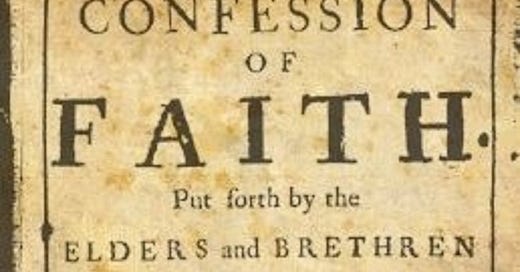If you want to get a group of Baptists fired up and debating, bring up the subject of confessionalism. Some Baptists continue to buy into the slogan of “No Creed but Christ” as a pious, nice-sounding statement to reject any notion of confessionalism. Others wrestle over the finer points of confessional subscription wondering how exactly a church should subscribe to a confessional document. These debates can sadly produce a mentality that confessions are only tools to exclude, to build walls, and to form a “cool kid’s club” with exclusive admission. The opposite end of that reaction though is hyper-individualism that sees confessions relegated to the dustbin of history.
How should we view confessions of faith? In the early years of his ministry in London, C.H. Spurgeon (1834-1892) reprinted a new edition of the Second London Baptist Confession of Faith. Spurgeon provided a preface addressed to the members of his church on why he reprinted the confession. He wrote, “This little volume is not issued as an authoritative rule, or code of faith, whereby you are to be fettered, but as an assistance to you in controversy, a confirmation in faith, and a means of edification in righteousness.”[1] Spurgeon’s counsel on the usage of the confession still provides helpful guidance in how to avoid equating confessionalism with polemicism. Yes, there is an element of accountability involved in confessional cooperation. However, one of the greatest uses of a confession is for “edification in righteousness,” meaning that confessions of faith properly used build up the people of God. This edification then leads to worship and doxology.
When one reads and studies a confession of faith (like the 2LBCF), the heart should be warmed and stirred by the precious truths being taught. For example, at the end of Chapter 2 on “Of God and the Holy Trinity,” the writers of the 2LBCF wrote “which doctrine of the Trinity is the foundation of all our communion with God, and comfortable dependence on Him.”[2] This chapter exemplifies the best writing by Baptists when it comes to the doctrine of the Trinity. A confession of faith is a protection against false teaching and heresy which is why doctrinal accountability must be tied to a confessional statement. However, we would be missing out on something tremendous if we only see these words in a polemical fashion. These are words to fuel our devotion and worship of the Triune God. Certainly, the early Particular Baptists grasped this blessed realization. The truths they confessed regarding the Trinity were the foundation for their communion with God. Confessionalism was not a mere abstract of logical progression nor was it a means of developing an exclusive club. The confession of faith contained a doxological component. That component is what Spurgeon was getting at when he described one the purposes of a confession being for edification.
As a member of a church that confesses the 2LBCF, I am thankful for how our pastors model this approach laid out by Spurgeon. However, it does trouble me that many who claim adherence to confessionalism seem to be mixing it with a more fundamentalist mindset. Fundamentalism, in its most pugnacious form, takes pleasure in creating purity tests to determine who is in and who is out. In recent years, debates in the Southern Baptist Convention over the Baptist Faith & Message have produced the charge that confessionalism is only a club to beat people over the head with. Now, some Baptists wrongly argue that cooperation can exist apart from confessionalism. The other error though is to see a confession of faith as something you only whip out when you want to win an argument or flex your power.
There is a right admonition to guard against a mere biblicism that amplifies personal experience and dismisses the witness of the church. However, I also think that there is a difference between robust confessionalism and searching for the theological splinters. While the call to be precise in our theology is one we need to heed, our affection for the Lord can be replaced by a desire to appear the purest and strongest in the faith at the expense of patient teaching. There can be a danger in pursuing confessional accountability to an extreme where mini magisteriums form. A group (or even one man!) interprets the confession and their interpretation becomes synonymous with the document itself. An even more dangerous path is that in decrying a mere biblicism, some neglect searching the Scriptures when it comes to matters of doctrine. The ditches on both sides of the road are littered with men on both extremes.
My plea is for us to go back to the sources and hear what the confession itself is teaching. Confessions summarize biblical truth in a systematic and logical way. All truth flows out of what we believe regarding the Triune God. As we understand who He is, then we see His decree, His covenant, His eternal purpose of grace, and so many more truths that should cause us to burst forth in joy and worship. If we are only looking at a confession as a badge that gets us into a club, then we have lost the very purpose for why such documents exist. A confession of faith is never about building up one’s ego, one’s club, or one’s platform. It is a document meant to serve the church and churches. Spurgeon was right that we should not see this document as a fetter. Nor should we see it as a weapon with which to beat people into submission. Instead, we should see a confession as a hymnal leading us into precious truth and magnifying the glory of our good and great God!
[1] C.H. Spurgeon, C.H. Spurgeon Autobiography: Volume 1: The Early Years, (Carlisle, PA: The Banner of Truth Trust, 1962), 397.
[2] Please see 2.3 at https://www.the1689confession.com/1689/chapter-2




Great word, Jake!
Jake, thanks for presenting these documents in such a way that we are sanctified.